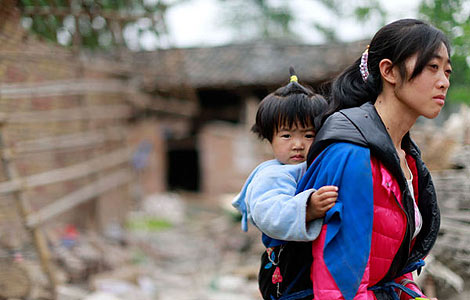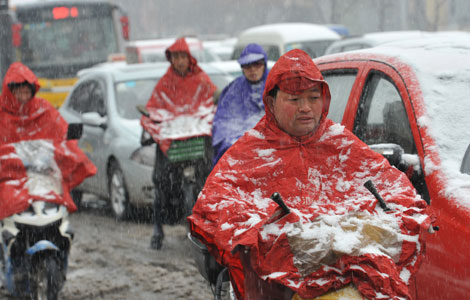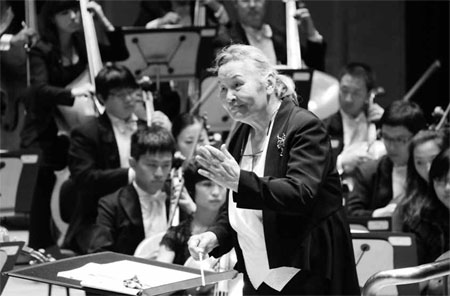Classical music's great champion
Updated: 2013-04-23 08:08
By Raymond Zhou (China Daily)
|
||||||||
|
Zheng Xiaoying, 84, conducts the Xiamen Philharmonic Orchestra at a performance in Singapore on April 12. Hu Junxin / Xinhua |

Symphonic music is more revered than loved in most Chinese cities. But one musician is bent on changing that. With guileless sincerity and boundless energy, she has won over skeptics and added luster to a city whose music tradition was for a while disrupted, writes Raymond Zhou.
Zheng Xiaoying is 84 years young. Yes, young. When she talks about her orchestra, you would never guess she is way past retirement age and this is her second or third career. A lesser mortal would probably have been struck down, both physically and mentally, by a fraction of the difficulties she has encountered.
One of those difficulties is the constant battle to get funded.
"To obtain financial support, you have to show your value to a city and its residents," says Zheng, founder and resident conductor of the Xiamen Philharmonic Orchestra in Fujian province.
Fifteen years ago, she departed from her position as principal conductor for the Central Opera Company in Beijing and founded the Xiamen Philharmonic. At first, city administrators did not understand why an orchestra had to spend so much on labor and instruments and play music few in the city could understand.
Zheng, the first female conductor in New China, started in an environment where classical music was more a puzzle than an asset. The Asian financial crisis hit right before its premiere in 1998 and the sponsor who had pledged to pay for the first concert fled with the pledged money. She recalls an incident when a municipal official earmarked a sum for the orchestra, adding it was for her sake. "I would have gotten up and left if not for the survival of the orchestra. That person did not know how important an orchestra would be to the city. He was doing me a personal favor."
After 1,200 concerts, the Xiamen Philharmonic is now a fixture on the city's cultural landscape and Zheng a local heroine. Unlike most orchestras in China, hers is not affiliated with the local government and gets only 35 percent of funding from it, with an additional 45 percent from corporate donors and 20 percent from the box office. This has turned out a much healthier mix of funding than most orchestras in the country, but as such, she has also endured more upheavals.
Her orchestra plays 45 percent of concerts for its music season, 27 percent for public service and the remainder for pure commercial engagements.
Yet, she does not wax nostalgic for the "good old days" of full State subsidy. When she was conducting for the Beijing-based opera house in the 1990s, there were only five or six performances a year, for a company of 300-plus staff. "People simply did not show up for work," says the Fujian native, who had been director of the department of conducting with the Central Music Conservatory prior to that. "They were paid a meager base salary, and they were more interested in moonlighting. But a professional orchestra has to practice every day to maintain its quality."
Now, money flows in when she announces a project. During her planning for a tour to Taiwan, an entrepreneur called her up and asked: "Do I have the honor to be the exclusive sponsor for your tour?"
Later, she visited that sponsor's manufacturing facility. "I was brought up to believe that private businesses were evil and now I have been able to open my eyes, just as I was opening their eyes and ears to the beauty of classical music," she says.
"I do not know these people and do not go binge drinking with them. Somehow they trust me. They must be telling themselves that the quaint old lady is doing something good for their city. For a symphony orchestra, you'll have to show them what you're good for, and not take things for granted. Having an orchestra is not an elitist or self-indulgent affair. You'll have to do something for the public, or you'll perish and nobody will miss you," she says.
During a recent tour to Russia, the orchestra played Echoes of Tulou, a Chinese symphony about Hakka people's traditional domicile. "What's the point of playing only Western music to a Western audience? To show you're capable of doing something they can recognize?"
The local hosting party strongly resisted the inclusion of a Chinese piece nobody in Russia had heard of, but Zheng persisted. The thunderous applause after the performance proved her right. "You have to push something of your own. If you're good, they'll accept it. That is your responsibility to the place that provides financing and nurtures you," she says.
"But it is not easy to find a quality work that is original and Chinese," she adds. She told her peers at the annual Chinese symphony orchestras summit, held in Xiamen this year, that one should not play Chinese music simply for the sake of Chinese music. It has to be good music in the first place.
Echoes of Tulou premiered in 2000. It was composed by Liu Yuan and commissioned by the Xiamen Philharmonic, which has performed it all over the world. Its musical language includes many local elements. Zheng, a Hakka herself, is not afraid to flaunt this unique flavor. In Berlin, a local chorus was hired to join in the vocal part - in Hakka dialect nonetheless.
To bring symphonic music to the masses, Zheng is willing to veer away from performance conventions. She talks before each piece, sometimes even between movements, so as to make symphonic music more accessible to those not accustomed to it. Guo Yihan, an executive with a software company, may speak for many Xiamenese when he says it was Zheng who brought this high art into the hearts of so many in this city, a city that actually produced many of China's top musicians of the classical canon. "She is definitely the pride of our city," says Guo.
Contact the writer at raymondzhou@chinadaily.com.cn.
(China Daily 04/23/2013 page20)

 Obama celebrates young inventors at science fair
Obama celebrates young inventors at science fair
 Earth Day marked around the world
Earth Day marked around the world
 Volunteer team helping students find sense of normalcy
Volunteer team helping students find sense of normalcy
 Ethnic groups quick to join rescue efforts
Ethnic groups quick to join rescue efforts
 Earthquake leaves family shattered
Earthquake leaves family shattered
 Boston Marathon bombing suspect charged
Boston Marathon bombing suspect charged
 Chasing vestiges of the Great Wall
Chasing vestiges of the Great Wall
 Weekly Photos: April 15-21
Weekly Photos: April 15-21
Most Viewed
Editor's Picks

|

|

|

|

|

|
Today's Top News
Russia criticizes US reports on human rights
China 'aims to share its dream with world'
Chinese president appoints 5 new ambassadors
Nation's IPR suits see spike in 2012
H7N9 not spread between humans: WHO
Health new priority for quake zone
Sino-US shared interests emphasized
China, ROK criticize visits to shrine
US Weekly

|

|







